- Home
- Neal Asher
The Voyage of the Sable Keech s-2 Page 2
The Voyage of the Sable Keech s-2 Read online
Page 2
Vrell felt tired as he scrambled through the darkness to the blast doors. His sealed wounds were now aching and itching, and there seemed a pressure in them. His tough Prador body was almost immune to any kind of infection, but he was beginning to wonder if he might have picked up some alien bug. He was also, he knew, suffering from oxygen deprivation.
The first door opened and he scrambled inside. He then approached the control panel and tried to get a pump working to extract the water, but it just would not respond. Angry, he slammed his claw against the wall beside the panel, and was surprised to see he had left a dent. Suddenly, the area of flesh underneath the patch over where he had lost his claw began to really hurt. Never mind the water, then. He input the code to open the second blast door. Nothing happened for a moment, then his father’s ident glyph appeared on the hexagonal screen. Vrell realized he had walked into one of the automatic code-change traps his father had spread throughout his ship. The doors now would not open unless an override was sent from Ebulan’s sanctum.
Vrell lost it then, smashing the panel and screen with his claw. This exacerbated the pain radiating from underneath his patches. His legs folded underneath him and he sank to the floor. It was no use; he was finished. Sudden weariness washed over him and he began to drift in and out of consciousness. In one lucid moment he realized this was the result of anoxia, but he was unable to do anything about it. He was going to suffocate in here. Blackness swamped his senses.
Time passed, a very great deal of time.
* * * *
‘This has to be the most alien skyscape I’ve seen, yet humans created it,’ said Janer.
He had seen many unusual worlds during his indenture and subsequent voluntary service to the hive mind. Here, strange weather patterns, due to the atmosphere’s odd gas mix and aerial algae, divided the sky with cloud layers in varying shades of blue and green like vast floating isles. And now, at sunset, a backdrop of half the sky was a veined explosion of indigo, gold and ruby. The sky alone would have been enough, but there were snairls here as well.
‘Genfactoring was at its height when humans first came here,’ the mind observed.
It spoke to him through the hivelink in his right ear. Two hornets, which were akin to two synapses in the hive mind and were also one facet of its disperse sensorium, rested in the transparent skin-stick box formed to his shoulder. He eyed them, noting the circuit patterns on their thoraxes and abdomens. He had only recently learnt that rather than decoration those patterns were the exterior evidence of the nanocircuitry linking synapse to synapse by radio, rather than by slow pheromonal transfer of thoughts as had originally been the case, for the hive minds had not been averse to benefiting from human technology. Though for humans it had been a shock to discover that they shared Earth with hive intelligences carried by hornet swarms—a fact impossible to accept for some. Even after long familiarity Janer still found the concept problematic.
Janer returned his attention to the spectacular sky, reached out and wiped condensation from the curving transparent shell before him, beyond which he observed a translucent bladder trailing tentacles, swept past by an errant wind.
‘That was one of the earliest adaptations,’ the mind commented.
Janer nodded. He knew this world’s history. When humans first came here the place had been choking on its own aerial algae, the ecosystem teetering on the edge of catastrophe since a volcanic eruption had provided a huge food resource for those floating diatoms, thus causing their population to explode. Computer models predicted as a consequence the extinction of all other life here within five thousand years.
‘Introduced to feed on the algae—an adaptation from the Portuguese man-of-war jellyfish.’ Janer pointed past the creature to a circling flock of rooks in the distance. ‘And they were introduced to feed on them when their population exploded. But in the end they weren’t enough to keep the algal population down. I know what happened here. If you recollect, I was required by you to research the history of this place when I first came here indentured to you.’
‘Of course I recollect. The capacity to forget is a purely human trait.’
Janer snorted and peered through the clouds. There: three huge life forms. Many creatures had been introduced here: alien, Terran, and adaptations of both. The one that had averted the ecological catastrophe was a splicing of humble snails, those same floating jellyfish and a couple of alien forms. The result was snairls.
Floating amid the slate clouds were three behemoth spiral shells like fairy towers. These supported huge grey-and-white snail bodies that probed the air with glistening antlers in search of rich masses of the algae on which the creatures fed.
Snairls hatched from eggs the size of footballs, dropping from the sky like jelly hail. They fed on the thick ground-slicks of dying algae, growing aerogel shells that they filled with helium. By the time they were the size of cows, they achieved buoyancy, and left the ground for richer fields. The genetic manipulation might have stopped with them had it not become a part of the very culture of this place. But here the rulers of humanity were the CGs—Chief Geneticists—and the manipulation continued. Some centuries past, a CG adapted humans to live in the slimy arteries and cysts inside snairl bodies. Now these people sailed the skies in their strange craft, trading genfactored artefacts. They were a long-lived people whose span was delimited by the life of their host. Janer turned away from his viewpoint within Upper Shell to observe the gas bags behind him, and to remember.
He had lived with the crew of this very snairl, the Graaf, and been aboard when it mated with another of its kind, and then died. He had seen the crew die inside it, and a lover die, and been saved from death himself by the hornets he then carried. The fleshy body of the Graaf had long since decayed and dropped away. Now this shell was ballasted, and driven through the sky by motorized screws attached to the huge shell he stood inside. It was also the home to hornets. Thousands of nests occupied Lower Shell—ballast being shed as they increased in number. This shell had seemed a safe haven to this particular hive mind. Other minds occupied other shells. But for the indigent and barely human population, this world belonged to the hornets. It was, inevitably, called Hive.
‘How many shells now?’ Janer asked.
‘One hundred and twenty—all minds older than myself.’
Janer winced. It was well to be reminded that this particular mind—the youngest—had been around for about ten thousand years. There were many more even older ones: strange minds seemingly incapable of communicating with humans, or perhaps just disinclined.
‘Most older minds still keep to Earth, though,’ he observed.
‘It’s what they know, though to me Earth seems more alien than other worlds I’ve visited.’
‘Yes, we saw many together.’ Janer was starting to get irritated. Over the last few hours the mind had just been rambling: it wasn’t getting to the point. The mind must have sensed this, again causing him to wonder just how close the hivelink keyed in to his thoughts.
‘You are independently wealthy,’ it said.
‘Certainly, and all due to you. But it wasn’t my fault you didn’t establish nests on Spatterjay. Is that what this is all about? Is that why you called me here?’
‘Spatterjay,’ the mind repeated.
In the background of that word arose an angry buzzing. Janer knew it to be mere theatre, since individual hornets might buzz, but the mind itself was a disperse and not easily definable entity, and it certainly did not make any noise it did not want to. He considered the strange and lethal world just named.
Second on Janer’s list of weird places he had visited was Spatterjay. A virus there toughened human bodies to nigh indestructibility, and there were people sailing the seas of that world, Old Captains, who had lived perhaps a thousand years. A strange place. A place where the most valuable commodity for the Hoopers—as the people there were called—was death. Death came in the form of a poison obtained at great risk from sea-going leeches the size of
whales. Sprine, they called it. Sprine was what this hive mind had once paid him to obtain for it, so it could adapt its hornets to carry the stuff in their stings and thus become the ruler of that world. Their mission had failed.
‘I do hope you’re not expecting to get your money back,’ said Janer, eyeing the hornets on his shoulder—which gave him at least something to address. ‘The Earth Central ruling was not open to interpretation. I did what you asked of me, even though I only did it so we could finally kill that damned skinner creature. And you were warned that your actions, though they might not be illegal under human law, would nevertheless not be tolerated.’
‘I do not want my money back,’ the mind sulked.
‘Then what do you want?’
‘Many people infect themselves with immortality,’ the mind told him.
Ah…
‘Yes,’ Janer agreed, ‘Spatterjay has become a big attraction for Polity citizens. We live in an age when you can choose your route to eternal youth, and some of those choices become quite esoteric’ Janer mulled that over. In the Polity, that political unit ruled by artificial intelligences and now spread across a considerable portion of the galaxy, death could quite often just be a matter of choice. ‘Are you going after the sprine again?’ he added. He studied the circular leech scar on the back of his hand through which he had been infected with the Spatterjay virus. Soon, before that virus started breaking down inside him and causing him some major problems, he would have to return to Spatterjay for reinfection. It was thus he himself had been infected with immortality.
‘I am not.’
‘I’m glad to hear it. For I suspect that, if you were to try, this partial home of yours might end up subject to an accidental meteor strike. Polity AIs tend to get a little tetchy when their warnings aren’t heeded.’
‘But someone else is,’ the mind added.
* * * *
‘Due to the lower gravity here and some minor tinkering with the trees’ genome, our redwoods can grow half a kilometre tall,’ explained Hannister, the tour guide. ‘They reach maturity very quickly—a hundred years—and that is when they are harvested.’ She turned from gazing up at the forest giants to survey her party.
Three were not easily identifiable. They were clad in grey enviro-suits, their faces concealed by domino masks. Two of them also wore short hooded flak jackets, while the other wore a tighter-fitting long black coat, which was also hooded. There seemed something unsavoury about them. The rest of the party consisted of a catadapt, an ophidapt, and five standard-format humans. The little girl, who was clearly the apple of her parents’ eye while an all-round pain in the arse to everyone else, was the first to pipe up.
‘But surely that’s not ecologically sound,’ she said in a kid’s voice seeming to contain a hint of fingernails on blackboard.
‘That would be the case if they were part of the local ecology, but they are not. Firstly the biota here is incapable of breaking down that quantity of cellulose, secondly, a falling mature tree often takes others down with it, and thirdly they are a valuable resource to the economy here.’
‘You make money out of them,’ said the girl.
Hannister hated talking to children, which made her particularly unsuited to this job. She turned to the rest. ‘Harvesting is also necessary because once the trees reach maturity they begin to produce viable seed. We do not want any of that seed germinating outside the plantations.’
‘Because a competitor might acquire seed or saplings,’ said the girl.
Hannister frowned at her, then decided it was about time she checked her aug. Her augmentation—a piece of computer hardware that nestled behind her ear and linked into both her brain and into vast informational networks—displayed some text in her visual cortex:
Smile Pettifor, 8 years solstan, Solsystem Abraxis Station…
She did not need to go any further. For a moment she thought the girl might be one of those people who preferred perpetual childhood to perpetual adulthood.
‘Are we to proceed to a harvesting now?’ hissed the masked individual in the black coat.
Hannister finally soft-linked to his ident and auged again:
Taylor Bloc, reification incept special request Anubis Arisen, Klader Alpha—
Reif?
Hannister suddenly felt her mouth go dry. She was not entirely clear about the details. On some world it had been fashionable to reanimate murder victims, using implanted technology, and send them after the murderers. These reanimations had possessed no intelligence, merely rough memcordings from their dead minds and programs to follow. In later years, as memcording from dead brains was perfected, people could live again. Some of them chose to live on in their own corpses—some cult had arisen out of it all. Reifications were high-tech zombies. Hannister felt it all very well for her to be showing around adapted humans, and brats, but she was not sure how she felt about acting as a tour guide to the dead. It was then she recognized a slight whiff of spoilt meat and realized it had been in the air all along.
‘Drave, do you know there are reifications in my group?’ she sent.
Drave replied: ‘Yes, I do, and, being as they are buying a whole tree from us, I suggest you treat them with the utmost consideration.’
‘Shall we move on?’ said Hannister, smiling.
They rode up on a supervisor’s platform to observe the harvesting. Other platforms, holding other tour groups, hovered in the forest nearby. Hannister gazed at the arboreal giants all around and felt a familiar loosening in her chest. They were awesome, and she was part of all this. Glancing back to her group she felt a flash of irritation. The tourists were surrounded by all this yet they were waiting to be entertained. She stooped and opened the locker to one side of the platform’s control column and began passing round disposable image intensifiers, glad they would not be returned because no way was she again handling the ones the reifs took.
‘Here comes the stripper,’ Hannister said, raising her intensifier to her eyes.
The drone dropping out of the lemon-stained sky bore the appearance of a giant horse fly, though it lacked wings. It homed in on the tree like that same insect sniffing bare skin, landed hard, low on the trunk, driving in the piton feet of its lower four legs. Its forelimbs remained free, and at the tips of them something glittered and blurred into motion—chainglass saws.
‘This design of drone is optimum for the task. We’ve learnt that over the years,’ Hannister told them.
‘Why chainglass?’ asked one of the normal humans.
‘Any kind of directed energy is a fire risk, and not very efficient. Chainglass cuts clean, keeps its edge for a very long time, and is cheap to replace.’
The drone began climbing, its pace constant as it reached and severed each branch close to the trunk, though its course necessarily spiralled to take it to every branch. Sawdust snowed down, coating both the drone and the ground below. Falling branches slammed into it, but it continued inexorably. Quickly reaching a point where the trunk was no wider than the branches sprouting from it, the drone cut around twice, and the upper section of the tree toppled. Hannister glanced down to watch treaded handlers with large spidery claws coming in to take up great piles of branches and cart them away for processing into paper. Another device sucked up the fallen sawdust. Nothing was wasted.
The drone then descended to the ground and waited, as around it the handlers soon cleared away all the remaining rubbish.
‘Now the carrier.’ Hannister pointed.
The machine now descending from the sky was a hundred-metre grey cylinder with fins down its entire length on one side, to cool its heavy-duty gravmotors, and with wide pincer clamps down the other side. It was utterly functional. It dropped parallel to the trunk, and closed its three clamps on the wood. Immediately the horse fly began cutting, two fountains of sawdust spraying from where its forelimbs entered the tree’s bole. The tree tottered, and they all heard the humming of the carrier’s gravmotors as it took up nearly a thousand tonn
es weight of wood. Slowly, tree and carrier rose into the sky.
‘Now it goes to the sawmill, to be cut up—usually into all sorts of wooden shapes already designated by the numerous customers who have bought the tree. Probably, that trunk will be turned into many thousands of items of furniture, planking, panelling, grips for knives or guns, wooden dice or toys. Not one cubic centimetre of wood will be wasted,’ said Hannister.
‘That is not precisely the case here.’
Hannister glanced round, auging at the same time. Taylor Bloc, the one who had spoken, removed his mask with a slight sucking sound and pulled back his hood to observe her. She bit down on the gasp. One side of the reification’s face was worn down to bone, his teeth exposed on that side in a perpetual grin. In that same side’s eye-socket, surprisingly, there remained an apparently alive but unlidded eye. The revealed skull above was translucent, showing liquid movement and the occasional glint of optics. The other side of his skull was clad in grey wrinkled skin, and his other brown eye retained its eyelid. Strangely, the reif seemed to be wearing silver spectacles—something Hannister had only ever seen in historical entertainments. She realized her mistake when a fine mist sprayed from the frames to moisten his eyeballs. From the spectacles themselves, where they hooked behind the ragged ear on the left side of his head, a pipe ran down, stapled to his neck, and into the collar of his envirosuit. He shrugged, as if accepting that he was hideous. Probably because of the spectacle-frame irrigator, he seemed to Hannister horribly, almost super-naturally, studious.

 The Bosch: A Novella (Polity Universe)
The Bosch: A Novella (Polity Universe) Jack Four
Jack Four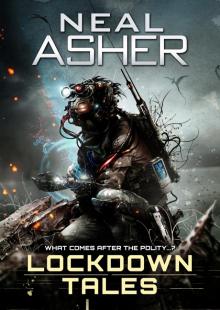 Lockdown Tales
Lockdown Tales The Warship
The Warship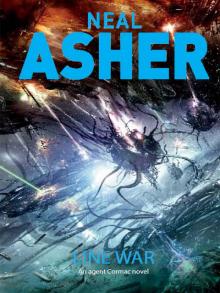 Line War
Line War Total Conflict
Total Conflict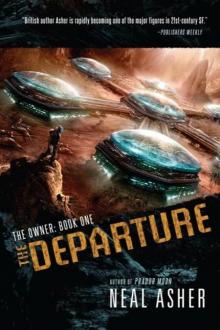 The Departure
The Departure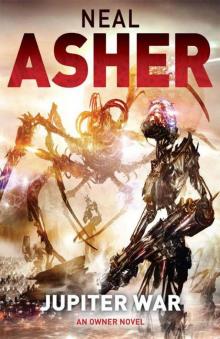 Owner 03 - Jupiter War
Owner 03 - Jupiter War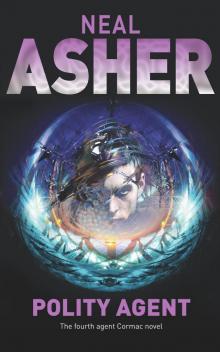 Polity Agent
Polity Agent Prador Moon
Prador Moon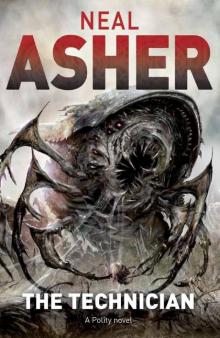 The Technician
The Technician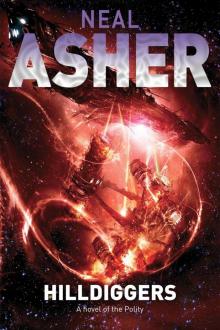 Hilldiggers
Hilldiggers Gridlinked
Gridlinked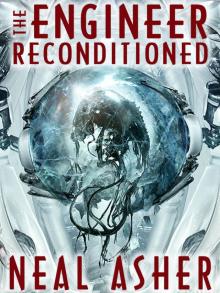 The Engineer ReConditioned
The Engineer ReConditioned Dark Intelligence
Dark Intelligence The Soldier: Rise of the Jain, Book One
The Soldier: Rise of the Jain, Book One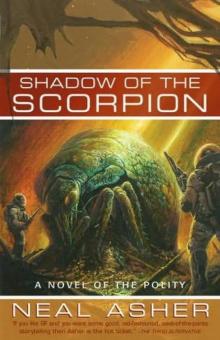 Shadow of the Scorpion p-2
Shadow of the Scorpion p-2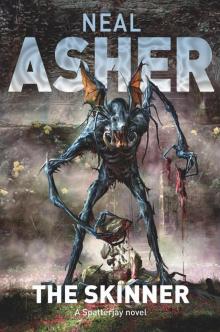 The Skinner
The Skinner The Soldier
The Soldier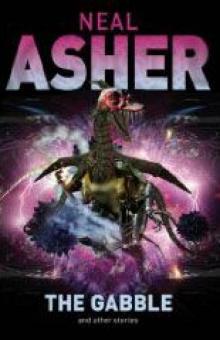 The Gabble p-13
The Gabble p-13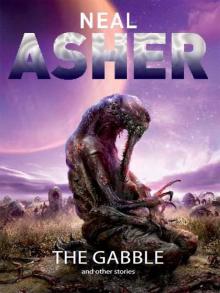 The Gabble and Other Stories
The Gabble and Other Stories The Parasite
The Parasite The Other Gun
The Other Gun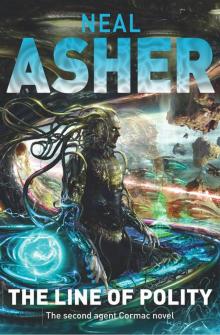 The Line of Polity
The Line of Polity Zero Point (Owner Trilogy 2)
Zero Point (Owner Trilogy 2)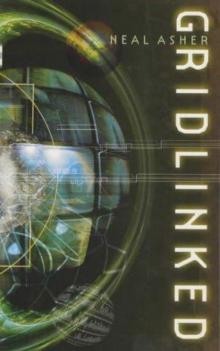 Gridlinked ac-1
Gridlinked ac-1 Prador Moon p-1
Prador Moon p-1 Infinity Engine
Infinity Engine Mindgames: Fool's Mate
Mindgames: Fool's Mate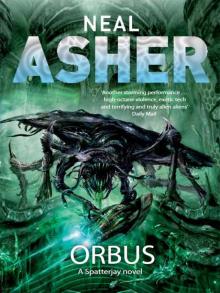 Orbus
Orbus Africa Zero
Africa Zero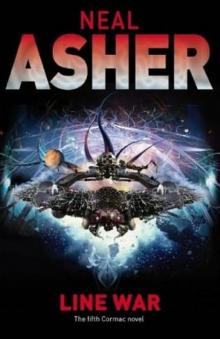 Line War ac-5
Line War ac-5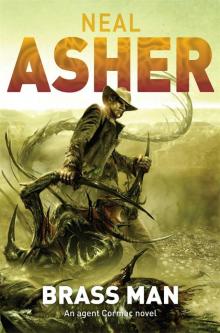 Brass Man
Brass Man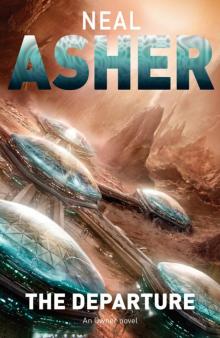 The Departure to-1
The Departure to-1 Cowl
Cowl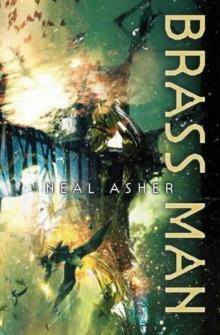 Brass Man ac-3
Brass Man ac-3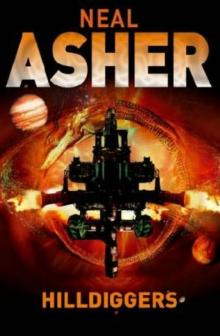 Hilldiggers (polity)
Hilldiggers (polity)![Greg Bear - [Eon Trilogy 1] - Eon (rescan) (v1.0) Read online](http://i1.bookreadfree.com/i2/04/08/greg_bear_-_eon_trilogy_1_-_eon_rescan_v1_0_preview.jpg) Greg Bear - [Eon Trilogy 1] - Eon (rescan) (v1.0)
Greg Bear - [Eon Trilogy 1] - Eon (rescan) (v1.0) The Skinner s-1
The Skinner s-1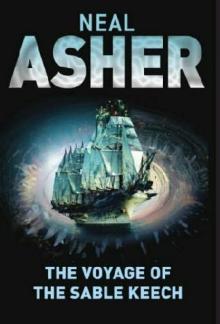 The Voyage of the Sable Keech s-2
The Voyage of the Sable Keech s-2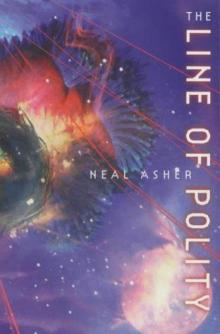 The Line of Polity ac-2
The Line of Polity ac-2 War Factory: Transformations Book Two
War Factory: Transformations Book Two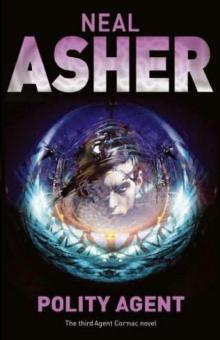 Polity Agent ac-4
Polity Agent ac-4